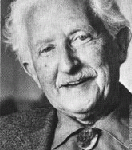Erik Erikson Psychosocial Theory of Child Development
Erik  Eriskon’s research on crisis has become a gospel for the psychologists dealing with human development. Erikson believed that as opposed to the popular belief human development continued beyond the adolescence and there is a series of stages of development or crisis that the individuals have to face to move on to the next level.
Eriskon’s research on crisis has become a gospel for the psychologists dealing with human development. Erikson believed that as opposed to the popular belief human development continued beyond the adolescence and there is a series of stages of development or crisis that the individuals have to face to move on to the next level.
Stage 1 – Trust Versus Mistrust
From birth to 1year: This is the stage when the infants are highly dependent on the carers. They expect the carers to give them love and affection. If they find that the carers care for them, give them the love and warmth then they find the world a safe haven. On the other hand, those who are not fortunate enough to get good care and warmth and love feel insecure, don’t trust anyone and cling on to the carers.
Stage 2 – Autonomy vs Shame and Doubt
1 to 3 years: This is the age when toddlers begin to consider themselves as separate entity. As they start their struggle for independence they have their own doubts about parents accepting this. They wouldn’t be sure whether the parents will let them make their choice or ignore them or neglect their wants. The toddlers would get over the guilty feeling of revolting against their parents if they are recognized as individuals with their own wants and interests.
Stage 3 – Initiative vs Guilt
3 to 6 years: The children exhibit skills like thinking, planning, organizing and also have a more obvious personality. They begin to start saying ‘No’ when they don’t want and mean it too. When they are not able to do simple tasks or don’t see meaning in what they are doing, then they feel guilty.
Stage 4 – Industry vs Inferiority
6 to 12 years: This is the age when kids start developing inferiority and superiority complex. They start formal schooling around this age and begin to compare themselves with their peers. They try to assess where they stand in the peer group, is their performance on par with the rest etc. If they find themselves ahead or same as the other then they consider themselves successful otherwise a failure and feel inferior.
Stage 5 – Identity vs Role Confusion
12 to 18 years: This is the adolescent period where the children make a constant effort to find themselves. They try to figure out their own beliefs, views on various things and their roles too. If they succeed in figuring their roles they grow out of adolescence around 18 years else continue in adolescence.
Stage 6 – Intimacy vs Isolation
18 to 30 years: This is one of the happenings years of life where the children turn into adults. They choose their career path, life partner, family etc. If the individual gets a job, life partner and other relationship as per his/her choice or accepts whatever he/she has got, then they experience a feeling of satisfaction and develop intimacy. If things don’t as per their choice and they don’t manage to have family or relationship as desired then such individual feel isolated.
Stage 7 – Generativity vs Stagnation
30 to old age: This is the stage when individuals are lot more matured and start thinking of doing things with a long term goal. They would want to contribute to the world and make their lives worthy and be remembered after their life time. This includes having a steady career growth, raise the children, have grandchildren, volunteering to tutor children and others that matter the most to them. If they don’t succeed in these then they feel stagnated. If they succeed in doing most of them, then they feel they have given a meaning to their life.
Stage 8 – Integrity vs Despair
Old age to death: Old age comes with lot of health problems and other issues. Death doesn’t seem far away. Those who can accept it as fact of live normally succeed through the crisis. They should do all the chores that is possible of them, visit family and friends etc. this is said to be Integrity. Despair is when they don’t succeed through the crisis. When the individual is scared of death and wants to run away from it rather than take it whenever it comes. Such people wouldn’t be friendly, shy away from friends and family and be depressed.